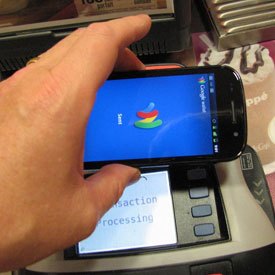
The real birth in electronic money is not Bitcoin, but Google Wallet. Standing in line at Starbucks you will see the under 25 crowd pay with their cell phones. Sorry, but Google is already there. Bitcoin cannot compete nor will traditional banks. Just as Amazon reduced book publishers to a subservient role at their direction, and book stores went out of business, while the internet is rendering newspapers obsolete, the trend to pay attention to is Google Wallet, which is targeting the traditional banks.
Google has launched in the US market its electronic purse known as the Google Wallet. This form of electronic money enables users to pay for the internet as well as a rising number of stores like Starbucks. However, Google Wallet also allows you to send and receive money. In Europe, the search engine already has a banking license and could start at any time. Because Google’s Android operating system runs on many smartphones, the company has the ready market globally. Google Wallet has the best conditions to establish their electronic money in Europe including Germany and Switzerland than any other system. The younger the generation, the greater the market share Google already has in place. Extending their business into banking will be much easier than anyone anticipates. Google is poised to emerge as a bank that nobody seems to quite appreciate at this time.
Apple’ latest iPhone is also equipped with a fingerprint sensor. The strategy in product development is clear. With this technology, your cell phone can become the most secure credit card because it  will require your fingerprint to function. Apple is using this technology in its  music platform iTunes that again is used in a greater proportion as you move down the age group..
Facebook is also applying for a banking license in Ireland. They intend to offer banking using its vast worldwide online network throughout Europe. We are looking at a younger generation moving rapidly to electronic money much faster than the older generations even think is possible.

